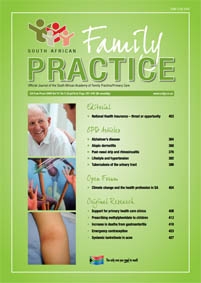Systemic isotretinoin in the management of acne – A patient questionnaire survey
Keywords:
Acne, Isotretinoin, Skin conditions, Drug utilisation, Questionnaire survey, Dermatology
Abstract
Background: The primary aim was to investigate the appropriateness (as outlined in the South African Acne Treatment Guideline1) for the prescription of systemic isotretinoin in the management and counselling of acne in the Nelson Mandela Bay Metropole. Methods: A questionnaire was distributed to patients receiving systemic isotretinoin by 30 community pharmacies. The response rate was 29.2% (57 respondents). Results: The acne medication history revealed that commercial brands of beauty products were used by 57.9% of respondents, topical benzoyl peroxide by 22.8%, and systemic cotrimoxazole by 19.3%. Only nine females used an oral contraceptive as acne treatment prior to isotretinoin. The average daily dose of isotretinoin was 44.2 (SD=16.9) mg. Half of the respondents received a suboptimal cumulative dosage of isotretinoin. The average prescribed duration of isotretinoin therapy was 6.2 months. Adequate counselling was received by only 57.9% of patients. A third of the patients who were able to fall pregnant received recommendations for contraception. Pregnancy tests were conducted in only two females. Just over 40% of patients reported a complete clearance of acne lesions. Conclusions: Many prescribers did not follow the recommendations for isotretinoin prescription. The counselling of patients regarding isotretinoin therapy was substandard, especially with respect to pregnancy prevention.
Published
2009-05-16
Section
Original Research
By submitting manuscripts to SAFP, authors of original articles are assigning copyright to the South African Academy of Family Physicians. Copyright of review articles are assigned to the Publisher, Medpharm Publications (Pty) Ltd, unless otherwise specified. Authors may use their own work after publication without written permission, provided they acknowledge the original source. Individuals and academic institutions may freely copy and distribute articles published in SAFP for educational and research purposes without obtaining permission.

